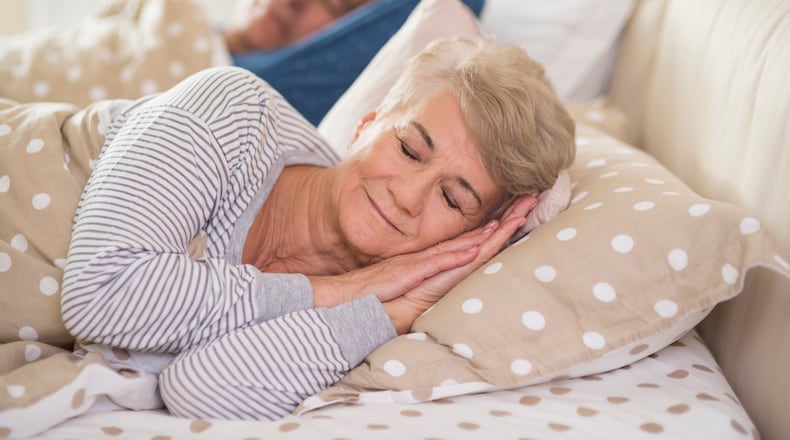Some people may find they fall asleep and start their morning earlier than they have in the past. This is common for senior citizens and it is known as the advanced sleep phase. It is not a concern as long as people wake up feeling rested.
Dr. Sarah Hussain is a sleep medicine specialist who practices in Miamisburg.
“Sleep is important for all age groups, from infancy into old age,” Hussain said. “A good night’s sleep is essential to all aspects of wellbeing.”
She notes the number of times individuals wake during the night may increase as people age. Sleep issues can be common for seniors, including trouble returning to sleep (after waking up at night), insomnia, or restless leg syndrome. Weight gain and laxity of tissues can lead to more snoring and possible sleep apnea.
Some sleep issues should never be ignored, such as sleep apnea, REM behavior disorder or excessive daytime sleepiness.
Hussain also advises that naps are an under-appreciated element of rest, noting that several studies demonstrate that napping is good for all age groups, including seniors.
“However, the length and timing of the nap are important,” Hussain said. “A short nap (up to 30 minutes) between 1 and 3 p.m., during the body’s natural circadian dip, is ideal. Napping during this window can boost productivity, mood, cognition, physical performance, and reduce stress.”
While individual needs can vary, in general naps after 3 p.m. can affect nighttime sleep.
A good bedtime routine can lead to sweet dreams and improve sleep quality. Try to go to bed and wake up at the same time each day — this helps regulate the body’s internal clock. Avoid bright, stimulating lights like the TV or scrolling on a phone or tablet for about an hour before bed. The light exposure can reduce melatonin, a hormone naturally released by the body in response to darkness (and promotes sleep). Listening to music or reading can be a relaxing way to wind down from the day. Maintain a bedroom temperature between 60 and 68 degrees.
Reserve the bedroom for sleep and sex only to maintain the brain’s association to the good stuff. If needed, remove televisions from the bedroom.
Hussain said people with sleep trouble should also avoid caffeine after 4 p.m. It is also best to avoid alcohol, which can lead to restlessness as it is processed. Sleep quality can also affect food choices, so a good night’s rest can lead to a healthier diet overall.
Staying physically active is also a great way to promote a good night’s sleep. Starting with small, achievable goals can support long-term health and sleep goals. If sleep issues persist, discuss with your physician whether the timing of medication could be an underlying cause. A sleep specialist can also be consulted for long-term sleep issues.
MORE ONLINE
Visit daytondailynews.com, journal-news.com and springfieldnewssun.com for “In Your Prime” content online and to sign up for our monthly newsletter for seniors.
About the Author

